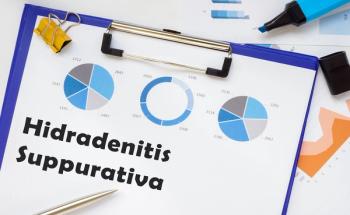
How Diet Is Related to Hidradenitis Suppurativa Symptoms
Hidradenitis suppurativa can either worsen or benefit depending on various dietary influences, either included, or excluded by the patient.
Hidradenitis suppurativa is also known as acne inversa, defined as a chronic autoinflammatory skin condition affecting hair follicles in flexural sites. Keratinocyte differentiation as well as genetic, environmental, hormonal, and lifestyle factors could influence the etiology of HS.
Obesity has been labeled has a major risk factor of HS, especially present in women of color. Metabolic syndrome (MetS) and obesity join in the progression of HS through meta-inflammation. Weight loss is a significant alteration in improved HS symptoms because it controls the general inflammation associated to HS and any MetS-induced inflammation. The review included independent searches using PubMed, Scopus, and Web of Science as their search engines.
Article reviewal separated evidence on dietary influences on HS, with a focus on potential immune mediated mechanisms underlying any influences. The Mediterranean diet (MD) revealed anti-inflammatory results. While some articles provided evidence of a decrease of HS severity after MD adherence, others found no associations among the groups. Adhering to the MD properly can lead to weight loss, decreasing the overall risk of MetS, which will reduce inflammation. However, diet and HS have complex relationships, unable to guarantee symptom-alleviation.
Reduction of carbohydrates and dairy intake has been linked to the improvement of HS symptoms. The rupture and occlusion of hair follicles can likely affect early stages of HS pathogenesis. It is believed the disintegration of dairy and carbohydrates leads to further insulin and insulin-like growth factor production. This then results in the activation of the mechanistic target of rapamycin creating pathways, ensuing androgen receptor stimulations, resulting in hyperkeratinization adding to follicular occlusion.
High fat diets can aggravate HS symptoms due to their induction of gut dysbiosis, escalating the inflammatory cytokines and minimizing antimicrobial peptides. The assembly of matrix metalloproteinases (MMPs) occurs when cytokines engage with inflammatory neutrophils and monocytes, altering the development of the sinus tract. Study reviewal exhibited the promotion of hyperkeratosis and neutrophilic infiltration of hair follicles through consumption of a high fat diet.
Documents indicated worse HS signs in diets with higher brewer’s yeast levels. Ingesting yeast products can hinder HS symptoms because of anti-Saccharyomyces cervisae immunoglobulin G. Patients with yeast sensitivities are especially at a higher risk for worsening HS symptomatology.
The studies examined the decrease supplements had on HS symptoms in patients. Zinc utilization displayed suppressive qualities rather than curative in some evidence. Overall, deficiency correlated to higher reactive oxygen species (ROS) and MMPs. Data also found zinc as a potential marker of disease severity. Zinc supplements have immune system modulation effects, reducing acute flares and achieving disease-free survival rates.
Vitamin D supplements are a recommended method of diet alteration since substantial information indicated HS severity to vitamin D deficiency. One study resulted in patients with HS embodying higher levels of vitamin D deficiency compared to the control groups. The relationship between vitamin D and skin immunology relies on the production of antimicrobial peptides, emerging skin inflammation after an excess of microbial buildup.
The production of elevated plasma homocysteine levels is directly related to the severity of HS symptoms. Pro-inflammatory effects of cytokines are largely related to homocysteine. Homocysteine is known to increase ROS generation via NADPH oxidase stimulation. However, vitamin B12 adjusts homocysteine levels, alluding towards beneficial effects of supplementation, reducing proinflammatory effects.
In summary, the exploration of literature pointed to no single diet for patients with HS symptoms, but the modification of dietary factors can potentially alleviate disease symptoms. Multiple diets have proved immune dysregulations occurring and overall worsening. However, study limitations were due to the reliance of observational data and sparse sample sizes which caused no distinct diet modifications in a personalized method of treatment. The authors concluded, “Healthcare providers should continue to maintain awareness of how diet impacts their HS patient’s symptoms and personalize management accordingly.”
Reference
Shen AS, Johnson JS, Kerns ML. Dietary factors and hidradenitis suppurativa. Dermatol Ther (Heidelb). 2023;13(12):3007-3017. doi:10.1007/s13555-023-01056-1
Newsletter
Stay ahead of policy, cost, and value—subscribe to AJMC for expert insights at the intersection of clinical care and health economics.








